Joskin invited the Irish Farmers Journal over to its headquarters in the town of Soumagne in Belgium, to visit two of its production plants and learn a bit about the business.
Company founder Victor Joskin started life as an agricultural contractor, before building his first machine in 1983.
Today, Joskin has 870 staff, five factories, 600 dealers across 60 countries and has built over 130,000 machines to-date.
The growth of Joskin is hugely impressive when you consider it’s still wholly owned and run as a family business.
Background
In 1968, Victor Joskin carried out work for local farmers, where the main tasks were spreading slurry and muck, along with planting and harvesting maize.
In 1972, Victor moved the business into servicing and repair of machinery, and two years later in 1974 he started to import machinery into Belgium.
Not overly happy with the machines then available on the market to spread slurry, Victor looked into building his own slurry equipment. The company’s first slurry tanker was built in 1984, a 777-gallon tanker (3,500 litre tank).
In 1984, he also bought a company building grass aerators, to keep production going all year round, which remains an important product for Joskin today.
The company
Joskin specialises in farm transport vehicles – notably slurry, muck, livestock, silage and grain, etc, which is then complemented by grassland equipment, such as tine harrows and aerators. Last year, the company’s turnover was almost €140m.
Joskin has five production facilities across Belgium, France and Poland, including a state-of-the-art galvanisation plant in Poland. The family business employs 870 staff across its sites.
Joskin builds in the region of 2,200 tankers and 1,600 trailers each year. The company galvanises 70-80% of what it produces. Slurry tankers account for 45-50% of production, while transportation, which is largely made up of trailers, accounts for 45%. Muck spreaders, which fall under transportation, make up about 8% of total production. The remaining 10% is made up of smaller products, such as its grass harrows and toppers.
Joskin’s slurry tankers are built in Soumagne and in Trzcianka in Poland.
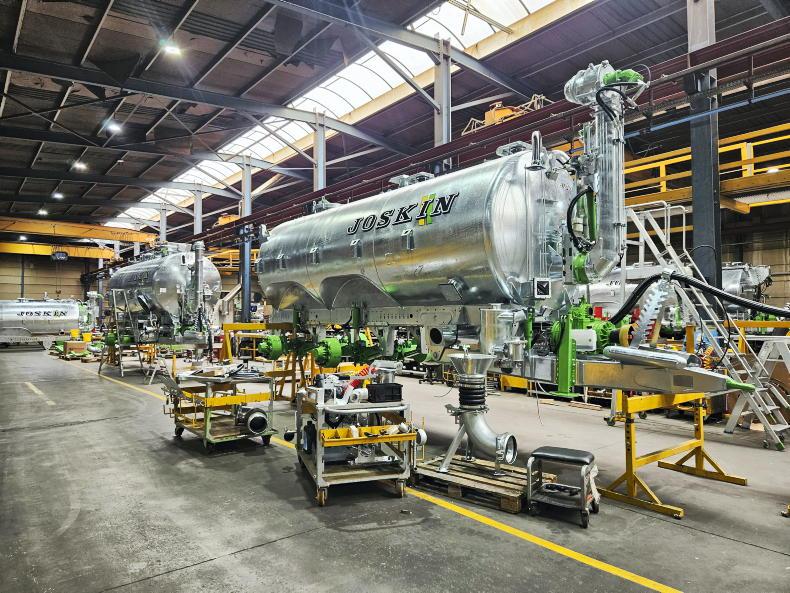
Joskin builds in the region of 2,200 tankers and 1,600 trailers each year.
This Polish factory was opened in 1999, before being expanded in 2010 with an 8,000m² galvanising plant. Close to Joskin HQ in Soumagne is the Spawtech plant, where welding and tack welding ahead of final construction take place. In France, its Bourges site was opened in 2002, where it builds tipping trailers. In 2012, Joskin added a site in northern France when it acquired the LeBoulch trailer brand.
New factories
Joskin recently began construction of a new factory in Luxembourg. The firm said Luxembourg was chosen based on the site location in addition to an available, local, skilled workforce. Joskin says that this 15,800m² site, built on a 6.2ha (15.3ac) plot, is scheduled to be commissioned in Q3 of 2025. It will house the assembly of large trailers and a range of muck spreaders, and will add 100 staff to the company.
In 2012, Joskin acquired French muck spreader and trailer company LeBoulch. Based in the Normandy region, Joskin has just invested in a new building to include welding workshops, automatic shot-blasting and a painting area.
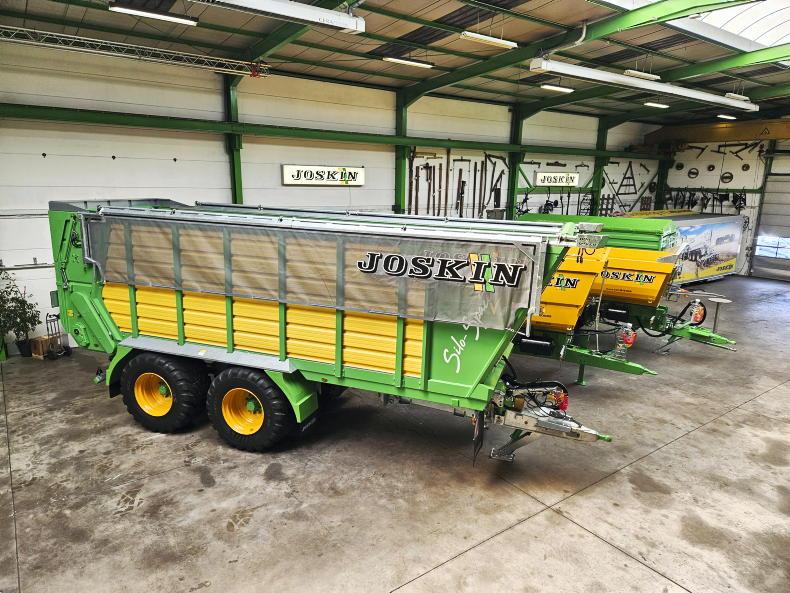
“Theres no Friday evening or Monday mornings with robotic welders,” laughs Jean-Marc.
This will add 40% more production capacity to the site, bringing it to a total of 21,000m².
Joskin’s aim is to double the number of LeBoulch trailers and spreaders produced annually, with plans to grow the brand’s presence in European markets. Alongside its own kit, the site manufactures Joskin bale trailers and its hook-lift trailers.
A family business
Joskin feels that the fact it remained a totally owned family business, rather than answering to a board of shareholders, allows it to react to the customer quicker and make investment decisions based on what’s best for the company long term.

Didier, Vinciane and Murielle Joskin.
Victor Joskin, who is now in his 70s, continues to be present day to day, but is more involved in the future of the business, overseeing investments. His three children, Didier, Vinciane and Murielle hold key positions within the business. Didier heads up production and IT, his sister Vinciane is over administration and finance, and other sister Murielle is over company communication and human resources.
Factory visit
We visited two factories, its headquarters at Soumagne and the nearby Spawtech plant. The HQ state-of-the-art 17.1ha (42.2ac) site holds 2,400t of sheet steel at any one time. Joskin offers more than 900 options across its slurry tanker range alone, with a staggering 120 different tyre options and about €2m worth of tyres in stock at any one time.
A lot of the equipment Joskin manufacturer is custom-built to order. Like a tractor factory, a new tanker or muck spreader is given an ID number and spec list, which follows it through the manufacturing and assembly process. The Joskin group use a centralised computer system across all its production sites, which allows precise management of the whole production process in real time.
Not every range is fully customisable. For example, Joskin explained that to stay competitive on pricing and to create efficiencies of scale within the factory, it offers the Advantage series. This range works off a standard specification.

Electro-hydraulics are manufactured in-house.
Lead times vary from standard machines such as the Advantage series which may be in stock, up to 16 weeks for its Modulo tanker range. It said that it sells tankers to 60 countries, so its needs to carry some stock.
Walking around the factories, Joskin’s investment into production is evident. For example, one hall is dedicated almost entirely to lathes, with 22 units, four of which are robotic.
These are complemented by a measuring robot, which ensures a high level of consistency.
Various parts of the production chain have been automated. Joskin uses laser cutters which can cut steel up to 25mm in thickness, automated saws and a fully automated press brake, alongside manually controlled units.
Robotic welders are used for larger jobs, using jigs that the company has built itself, with manual welders handling smaller tasks.

All tack welding is completed by humans, before the robotic welders take on the main welding.
When it comes to fabrication, all tack welding is completed by humans, before the robotic welders take on the main welding. Joskin sees the benefit in investing in making production more efficient. For example, it recently added two robotic welders which only weld trailer bodies.
The company said that welding 8m tri-axle trailer bodies that once took three days of manual welding is completed in seven hours with one robot.
Joskin typically use around 1,500t of steel each month. In recent years, it has added a 1,000t press and, more recently, two fully automated positive and negative folding presses, claimed to be unique in the world.
Components
Joskin manufactures 85% of the components it uses in-house. It even builds its own hydraulic rams (apart from trailer tipping rams).
Joskin prides itself on making as much of its own parts as possible and, in fact, it even manufactured parts for Mercedes Benz for a while. Joskin says that in order to keep control over quality and stock levels, it invests in production each year.

These pieces were produced by a 3D printer, measuring and reproducing componentry down to one micron.
Part of this investment saw the firm recently purchase a 3D scanner and printer. Joskin claims this gives huge flexibility to design and print prototype parts for production.
This piece of technology is capable of measuring and reproducing componentry down to one micron.
Just to put that into perspective, a single average human hair is around 100 microns in size.
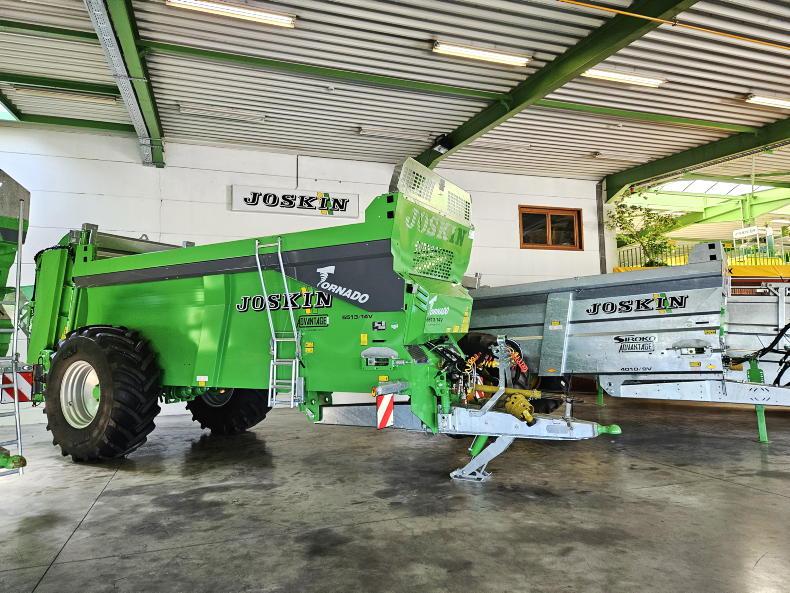
Muck spreaders make up about 8% of total production.
Joskin’s main plant has 8,000 solar panels, feeding three large storage batteries. When there isn’t a demand for power from the plant, such as in the evenings, the power is sold into the grid.
Galvanising
“There is this stigma out there that galvanising costs much more than painting – this isn’t necessarily true. In fact, on our price list, there is very little between painting and galvanising,” explained export manager Jean-Marc Vanempten.

The company galvanises 70-80% of what it produces.
Joskin products are known worldwide for their galvanised finish. All tankers made in Belgium are galvanised in Belgium. Meanwhile, all parts and componentry are galvanised in its Polish plant. Joskin claims that it has the capacity to galvanise twice as much kit as it currently is doing, and for other companies too.
Firstly, the steel is shot-blasted. It’s then coated with a mixture of steel and zinc, followed by a layer of pure zinc.
The outer galvanisation coat isn’t as hard and absorbs the shocks. Painted components are shot-blasted and electrically charged. Joskin says this is for better adhesion when spraying with an initial layer of epoxy primer and final layer coat. Painted components such as axels and pumps are then fitted to the galvanised body.
Slurry
Slurry is Joskin’s bread and butter product. Its most popular size tankers are tandem axle, 4,000 to 4,400-gallon units.
The tanker barrels are fabricated at the Spawtech facility. The steel here is folded, tack welded and reinforced inside. Depending on the tanker, 4-6mm S420 grade steel is rolled into the barrel shape and tack welded.
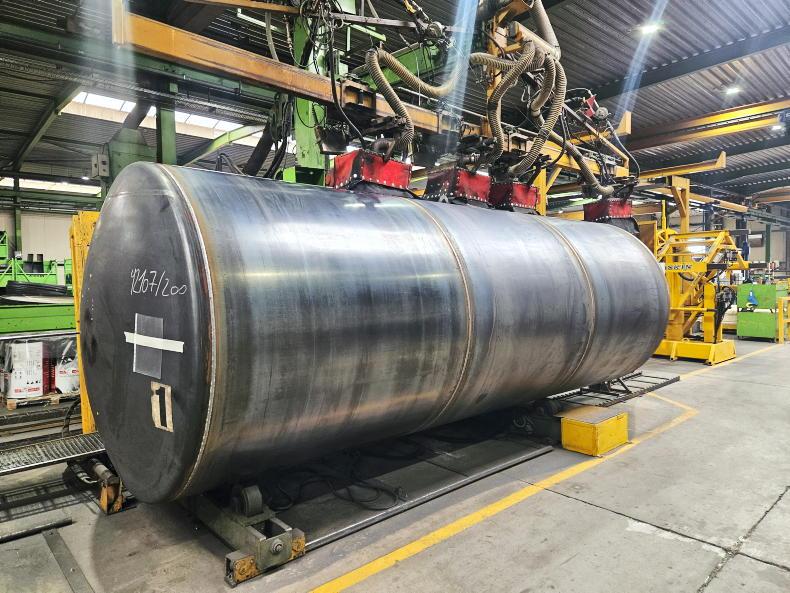
Joskin’s slurry tankers are built in Soumagne and in Trzcianka in Poland.
Baffles are positioned every two metres, with a six-metre-long tank using two baffles. It takes three hours to tack weld a standard tanker, with the internal tank then completely robotically welded in 90 minutes.
“There are no Friday evening or Monday mornings with robotic welders,” laughed Jean-Marc.
The firm patented its first macerator design in 1990 and today offers six variations of slurry pumps. Vacuum pumps account for 60%, lobe pumps 10%, spiral pumps 10% and its hybrid Vacu-Storm pump accounts for the remaining 10%.
The Vacu-Storm pump is a hybrid system developed by Joskin seven years ago.
It combines the advantages of a vacuum pump on the suction side and a Storm centrifugal pump on the discharge side. Joskin says Vaccum pumps are limited to a working width of 12m. The 13,000l Jurop pump is integrated in the drawbar and is used for suction. The Storm centrifugal pump (10,000 l/min) is designed to feed the rear implement and allows spreading over larger widths and with a high and constant flow rate.
Is the Joskin kit expensive?
One-point Joskin really wanted to get across, was that it is no more expensive than other manufacturers. Didier Joskin acknowledged that Joskin has a reputation for being expensive, something the company feels isn’t the case.
“I think when you look at what you get with a Joskin tanker, we’re actually very competitive because a lot of features that would be options with other brands are included as standard with us.”
In an effort to break the stigma around this, and make the brand even more competitive on price, Joskin introduced the Advantage range in 2019.
This is now available on the majority of its product offering, with the idea to standardise the general build of machines. Much of this kit can be then fitted with some of the 900+ options before completion, or as a retrofit option. Today, between 70 to 80% of the tankers sold are Advantage models.
For example, a 2,500-gallon Advantage tanker with a 7.5m trailing shoe with a complete integrated electro-hydraulic system with control box is priced at €42,000 plus VAT.
Machinery retail business
Victor Joskin set up his own machinery retail business in 1973, which is still in operation today. The firm is a Fendt and Massey Ferguson dealer, a JCB sub dealer and import and distribute eight brands across Belgium. These include Strautmann, Rauch, Quicke, Monosem, Hardi, Bednar, Evrard and Breviagri.
The manufacturing site and retail side of the business share a 13m-high, automated central parts warehouse.
Capable of holding a staggering 2,700t, the 900 shelves each hold up to 3t each. When parts are put in the system, or taken out, the machine will shift the shelves around itself automatically, with the goal of optimising space.
Future of the business
Joskin has no plans to slow down, with future investments planned for France, Belgium and Poland, with the new Luxemburg plant to open in 2025.
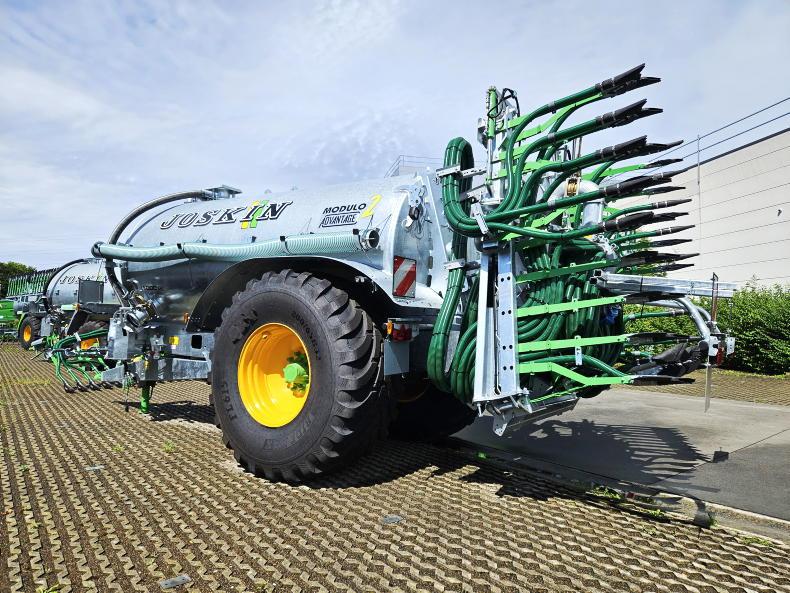
This 2,500-gallon Advantage tanker with a 7.5m trailing shoe with a complete integrated electro hydraulic independent with control box is priced at €42,000 plus VAT.
“Into the future, slurry tankers might drop from 45% to 30% of our total production. I think that the future for slurry tankers will be less machines, but larger tankers with higher specification.
However, Joskin sees huge potential for the muck spreader business. The waste market around the world is still 70% solids. So, there are many opportunities for us to grow our market share.”
Joskin invited the Irish Farmers Journal over to its headquarters in the town of Soumagne in Belgium, to visit two of its production plants and learn a bit about the business.
Company founder Victor Joskin started life as an agricultural contractor, before building his first machine in 1983.
Today, Joskin has 870 staff, five factories, 600 dealers across 60 countries and has built over 130,000 machines to-date.
The growth of Joskin is hugely impressive when you consider it’s still wholly owned and run as a family business.
Background
In 1968, Victor Joskin carried out work for local farmers, where the main tasks were spreading slurry and muck, along with planting and harvesting maize.
In 1972, Victor moved the business into servicing and repair of machinery, and two years later in 1974 he started to import machinery into Belgium.
Not overly happy with the machines then available on the market to spread slurry, Victor looked into building his own slurry equipment. The company’s first slurry tanker was built in 1984, a 777-gallon tanker (3,500 litre tank).
In 1984, he also bought a company building grass aerators, to keep production going all year round, which remains an important product for Joskin today.
The company
Joskin specialises in farm transport vehicles – notably slurry, muck, livestock, silage and grain, etc, which is then complemented by grassland equipment, such as tine harrows and aerators. Last year, the company’s turnover was almost €140m.
Joskin has five production facilities across Belgium, France and Poland, including a state-of-the-art galvanisation plant in Poland. The family business employs 870 staff across its sites.
Joskin builds in the region of 2,200 tankers and 1,600 trailers each year. The company galvanises 70-80% of what it produces. Slurry tankers account for 45-50% of production, while transportation, which is largely made up of trailers, accounts for 45%. Muck spreaders, which fall under transportation, make up about 8% of total production. The remaining 10% is made up of smaller products, such as its grass harrows and toppers.
Joskin’s slurry tankers are built in Soumagne and in Trzcianka in Poland.

Joskin builds in the region of 2,200 tankers and 1,600 trailers each year.
This Polish factory was opened in 1999, before being expanded in 2010 with an 8,000m² galvanising plant. Close to Joskin HQ in Soumagne is the Spawtech plant, where welding and tack welding ahead of final construction take place. In France, its Bourges site was opened in 2002, where it builds tipping trailers. In 2012, Joskin added a site in northern France when it acquired the LeBoulch trailer brand.
New factories
Joskin recently began construction of a new factory in Luxembourg. The firm said Luxembourg was chosen based on the site location in addition to an available, local, skilled workforce. Joskin says that this 15,800m² site, built on a 6.2ha (15.3ac) plot, is scheduled to be commissioned in Q3 of 2025. It will house the assembly of large trailers and a range of muck spreaders, and will add 100 staff to the company.
In 2012, Joskin acquired French muck spreader and trailer company LeBoulch. Based in the Normandy region, Joskin has just invested in a new building to include welding workshops, automatic shot-blasting and a painting area.

“Theres no Friday evening or Monday mornings with robotic welders,” laughs Jean-Marc.
This will add 40% more production capacity to the site, bringing it to a total of 21,000m².
Joskin’s aim is to double the number of LeBoulch trailers and spreaders produced annually, with plans to grow the brand’s presence in European markets. Alongside its own kit, the site manufactures Joskin bale trailers and its hook-lift trailers.
A family business
Joskin feels that the fact it remained a totally owned family business, rather than answering to a board of shareholders, allows it to react to the customer quicker and make investment decisions based on what’s best for the company long term.

Didier, Vinciane and Murielle Joskin.
Victor Joskin, who is now in his 70s, continues to be present day to day, but is more involved in the future of the business, overseeing investments. His three children, Didier, Vinciane and Murielle hold key positions within the business. Didier heads up production and IT, his sister Vinciane is over administration and finance, and other sister Murielle is over company communication and human resources.
Factory visit
We visited two factories, its headquarters at Soumagne and the nearby Spawtech plant. The HQ state-of-the-art 17.1ha (42.2ac) site holds 2,400t of sheet steel at any one time. Joskin offers more than 900 options across its slurry tanker range alone, with a staggering 120 different tyre options and about €2m worth of tyres in stock at any one time.
A lot of the equipment Joskin manufacturer is custom-built to order. Like a tractor factory, a new tanker or muck spreader is given an ID number and spec list, which follows it through the manufacturing and assembly process. The Joskin group use a centralised computer system across all its production sites, which allows precise management of the whole production process in real time.
Not every range is fully customisable. For example, Joskin explained that to stay competitive on pricing and to create efficiencies of scale within the factory, it offers the Advantage series. This range works off a standard specification.

Electro-hydraulics are manufactured in-house.
Lead times vary from standard machines such as the Advantage series which may be in stock, up to 16 weeks for its Modulo tanker range. It said that it sells tankers to 60 countries, so its needs to carry some stock.
Walking around the factories, Joskin’s investment into production is evident. For example, one hall is dedicated almost entirely to lathes, with 22 units, four of which are robotic.
These are complemented by a measuring robot, which ensures a high level of consistency.
Various parts of the production chain have been automated. Joskin uses laser cutters which can cut steel up to 25mm in thickness, automated saws and a fully automated press brake, alongside manually controlled units.
Robotic welders are used for larger jobs, using jigs that the company has built itself, with manual welders handling smaller tasks.

All tack welding is completed by humans, before the robotic welders take on the main welding.
When it comes to fabrication, all tack welding is completed by humans, before the robotic welders take on the main welding. Joskin sees the benefit in investing in making production more efficient. For example, it recently added two robotic welders which only weld trailer bodies.
The company said that welding 8m tri-axle trailer bodies that once took three days of manual welding is completed in seven hours with one robot.
Joskin typically use around 1,500t of steel each month. In recent years, it has added a 1,000t press and, more recently, two fully automated positive and negative folding presses, claimed to be unique in the world.
Components
Joskin manufactures 85% of the components it uses in-house. It even builds its own hydraulic rams (apart from trailer tipping rams).
Joskin prides itself on making as much of its own parts as possible and, in fact, it even manufactured parts for Mercedes Benz for a while. Joskin says that in order to keep control over quality and stock levels, it invests in production each year.

These pieces were produced by a 3D printer, measuring and reproducing componentry down to one micron.
Part of this investment saw the firm recently purchase a 3D scanner and printer. Joskin claims this gives huge flexibility to design and print prototype parts for production.
This piece of technology is capable of measuring and reproducing componentry down to one micron.
Just to put that into perspective, a single average human hair is around 100 microns in size.

Muck spreaders make up about 8% of total production.
Joskin’s main plant has 8,000 solar panels, feeding three large storage batteries. When there isn’t a demand for power from the plant, such as in the evenings, the power is sold into the grid.
Galvanising
“There is this stigma out there that galvanising costs much more than painting – this isn’t necessarily true. In fact, on our price list, there is very little between painting and galvanising,” explained export manager Jean-Marc Vanempten.

The company galvanises 70-80% of what it produces.
Joskin products are known worldwide for their galvanised finish. All tankers made in Belgium are galvanised in Belgium. Meanwhile, all parts and componentry are galvanised in its Polish plant. Joskin claims that it has the capacity to galvanise twice as much kit as it currently is doing, and for other companies too.
Firstly, the steel is shot-blasted. It’s then coated with a mixture of steel and zinc, followed by a layer of pure zinc.
The outer galvanisation coat isn’t as hard and absorbs the shocks. Painted components are shot-blasted and electrically charged. Joskin says this is for better adhesion when spraying with an initial layer of epoxy primer and final layer coat. Painted components such as axels and pumps are then fitted to the galvanised body.
Slurry
Slurry is Joskin’s bread and butter product. Its most popular size tankers are tandem axle, 4,000 to 4,400-gallon units.
The tanker barrels are fabricated at the Spawtech facility. The steel here is folded, tack welded and reinforced inside. Depending on the tanker, 4-6mm S420 grade steel is rolled into the barrel shape and tack welded.

Joskin’s slurry tankers are built in Soumagne and in Trzcianka in Poland.
Baffles are positioned every two metres, with a six-metre-long tank using two baffles. It takes three hours to tack weld a standard tanker, with the internal tank then completely robotically welded in 90 minutes.
“There are no Friday evening or Monday mornings with robotic welders,” laughed Jean-Marc.
The firm patented its first macerator design in 1990 and today offers six variations of slurry pumps. Vacuum pumps account for 60%, lobe pumps 10%, spiral pumps 10% and its hybrid Vacu-Storm pump accounts for the remaining 10%.
The Vacu-Storm pump is a hybrid system developed by Joskin seven years ago.
It combines the advantages of a vacuum pump on the suction side and a Storm centrifugal pump on the discharge side. Joskin says Vaccum pumps are limited to a working width of 12m. The 13,000l Jurop pump is integrated in the drawbar and is used for suction. The Storm centrifugal pump (10,000 l/min) is designed to feed the rear implement and allows spreading over larger widths and with a high and constant flow rate.
Is the Joskin kit expensive?
One-point Joskin really wanted to get across, was that it is no more expensive than other manufacturers. Didier Joskin acknowledged that Joskin has a reputation for being expensive, something the company feels isn’t the case.
“I think when you look at what you get with a Joskin tanker, we’re actually very competitive because a lot of features that would be options with other brands are included as standard with us.”
In an effort to break the stigma around this, and make the brand even more competitive on price, Joskin introduced the Advantage range in 2019.
This is now available on the majority of its product offering, with the idea to standardise the general build of machines. Much of this kit can be then fitted with some of the 900+ options before completion, or as a retrofit option. Today, between 70 to 80% of the tankers sold are Advantage models.
For example, a 2,500-gallon Advantage tanker with a 7.5m trailing shoe with a complete integrated electro-hydraulic system with control box is priced at €42,000 plus VAT.
Machinery retail business
Victor Joskin set up his own machinery retail business in 1973, which is still in operation today. The firm is a Fendt and Massey Ferguson dealer, a JCB sub dealer and import and distribute eight brands across Belgium. These include Strautmann, Rauch, Quicke, Monosem, Hardi, Bednar, Evrard and Breviagri.
The manufacturing site and retail side of the business share a 13m-high, automated central parts warehouse.
Capable of holding a staggering 2,700t, the 900 shelves each hold up to 3t each. When parts are put in the system, or taken out, the machine will shift the shelves around itself automatically, with the goal of optimising space.
Future of the business
Joskin has no plans to slow down, with future investments planned for France, Belgium and Poland, with the new Luxemburg plant to open in 2025.

This 2,500-gallon Advantage tanker with a 7.5m trailing shoe with a complete integrated electro hydraulic independent with control box is priced at €42,000 plus VAT.
“Into the future, slurry tankers might drop from 45% to 30% of our total production. I think that the future for slurry tankers will be less machines, but larger tankers with higher specification.
However, Joskin sees huge potential for the muck spreader business. The waste market around the world is still 70% solids. So, there are many opportunities for us to grow our market share.”
















 This is a subscriber-only article
This is a subscriber-only article





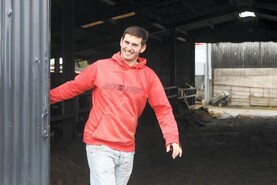

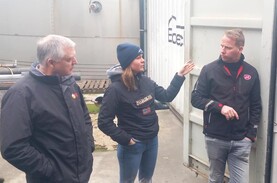


SHARING OPTIONS: